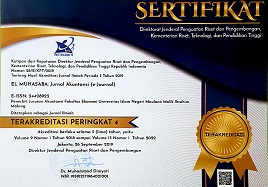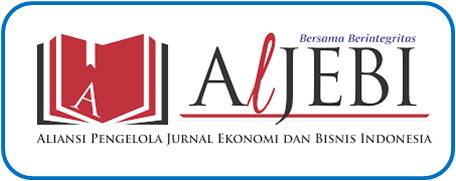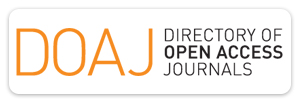PENGETAHUAN ETIKA AKUNTANSI, RELIGIUSITAS DAN LOVE OF MONEY SEBAGAI DETERMINAN PERSEPSI ETIS MAHASISWA AKUNTANSI
Abstract
This study aims to determine the perceptions of accounting students, about the influence of ethical knowledge, religiosity, and love of money from Islamic-based university.
This research used quantitative research. The technique of data analysis that used to test the hypothesis is simple and multiple regression analysis sample in this study were 151 respondents.Data were collected using a questionnaire.The results of this study indicate that Ethical Knowledge and Religiosity have a positive effect on the Ethical Perceptions of Accounting Students.While Love of Money had a negative effect on the Ethical Perceptions of Accounting Students.From the results of the simultaneous test of Ethics Knowledge, Religiosity, and Love of Money on Ethical Perception of Accounting Students has a simultaneous effect. The higher level of the understanding of their religion, so the level of their money more less than before, vice versa.
Keywords
Full Text:
PDFReferences
Agoes Sukrisno dan Ardana Cenik, I. (2009). Etika Bisnis dan Profesi (tantangan membangun manusia seutuhnya). Jakarta: Salemba empat.
Al-Qur’an Karim Terjemahaan dan As Sunnah
Ancok Djamaludin dan Suroso Nashori, F. (2011). Psikologi Islami. Yogyakarta: Pustaka Pelajar
Bertens. (2013). Etika. Yogyakarta: Kanisius
Chen, Y.J. dan Tang, T.L.P. 2006. “Attitude toward and propensity to engage in unethical behavior: measurement invariance across major among university students”, Journal of Business Ethics,Vol. 69, pp. 77-93.
Elias, R. Z. (2009). The Impact of Anti-Intellectualism Attitudes and Academic Self Efficacy on Business Students’ Perceptions of Cheating. Journal ofBusiness Ethics, 86, 199-209. New York: Springer.
Fiqoh Himmah Elok. (2013). Persepsi Etis Mahasiswa Akuntansi Mengenai
Skandal Etis Auditor dan Corporate Manager. Jurnal Akuntansi Multiparadigma. Malang
Ghozali Imam. (2011). Aplikasi Analisis Multivariate dengan Program SPSS. Semarang: Universitas Diponogoro
Gulo W. (2010). Metodologi Penelitian. Jakarta: PT Gramedia Widiasarana Indonesia
Hadi Sutrisno. (2001). Statistik. Yogyakarta : Andi Offset
Hayes, J. V. (2006). “Money Attitudes Economic Locus of control and Financial Strain Among College Students.” A Disertation. Texas Tech University
Jalaluddin. (2011). Psikologi Agama. Jakarta:Rajawali
Jusuf Al Haryono. (2010). Pengauditan. Yogyakarta: Sekolah Tinggi Ilmu Ekonomi YKPN
Kent T. Yamuchi and Donald I. Templer. (1982). The Development of a Money Attitude Scale. Jurnal of Personality, 46,5
King A. Laura. (2013). Psikologi Umum. Jakarta :Salemba Humanika
Lubis Ikhsan Arfan. (2011). Akuntansi Keperilakuan. Jakarta: Salemba Empat
Lubis, dan Al dan Ishak, M. (2005). Akuntansi Keperilakuan.Jakarta: Salemba Empat
Madison, R.L. (2002), “Is failure to teach ethics the causal factor?”, Strategic Finance, Vol. 84, pp. 24-6.
Muchlas Makmuri. (2008). Perilaku Organisasi. Yogyakarta: Gajah Mada University Press
Nopirin. (2014). Ekonomi Moneter. Yogyakarta: BPFE
Revita Mardawati. (2014). Pengaruh orientasi etis, gender, dan pengetahuan etika terhadap persepsi mahasiswa akuntansi atas perilaku tidak etis akuntan (studi pada mahasiswa akuntansi universitas negeri yogyakarta). Yogyakarta: Skripsi Universitas Negeri Yogyakarta.
Sugiyono. (2011). Metode Penelitian Kuantitatif, Kualitatif, dan R&D. Bandung: Alfabeta. (2012). Statistik untuk penelitian. Bandung. Alfabeta
Tang , T.L.P. and Chen,Y.J. (2008). “Inteleligence vs Wisdom: The love of
Money, Machiavellianism and Unethecial Behavior Across College Majorand Gender”. Journal ofBusiness And Ethic, Vol 82, pp. 1-26.
Tang, T.L.P. and Chiu, R.K.. (2003). “Income Money Ethic, Pay, Satisfaction, Commitment, and Unethical Behaviour: Is the Love of Money The Root of Evil for Hongkong Employees ?”,Journal Business Ethic, Vol. 46, pp. 542-8.
Tang, Thomas Li-Ping., David Shin-Hsiung Tang, & Roberto Luna-Arocas. (2005). “Money Profiles: The Love of Money, Attitudes, and Needs”. Personnel Review, Vol. 34 Iss pp.603-618
Walgito Bimo. (2007). Psikologi Kelompok. Yogyakarta: Andi
Wati Mirna dan Sudibyo Bambang. (2016). Pengaruh pendidikan etika bisnis dan religiusitas terhadap persepsi etis mahasiswa akuntansi. Yogyakarta: Jurnal Universitas Gadjah Mada
Wilujeng, Kristianingsih. (2013). Pengaruh Self Efficacy dan Religiusitas Terhadap Academic Dishonesty yang dilakukan mahasiswa Perguruan tinggi Umum dan Berbasis Agama di Kota Malang. Universitas Negeri Malang.
DOI: https://doi.org/10.18860/em.v11i2.8067
Refbacks
- There are currently no refbacks.
Editorial Office:
Megawati Soekarnoputri Building
Accounting Department, Faculty of Economics
Jln. Gajayana 50 Telp (0341) 558881
E-mail: elmuhasaba@uin-malang.ac.id
Universitas Islam Negeri Maulana Malik Ibrahim Malang
E-ISSN 2442-8922
P-ISSN 2086-1249

This work is licensed under a CC BY SA 4.0 International License

















